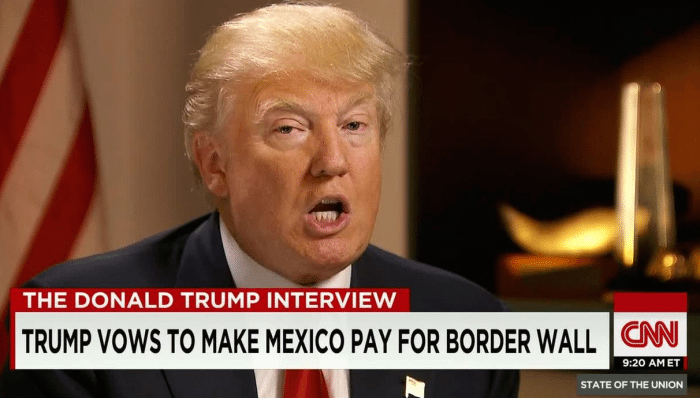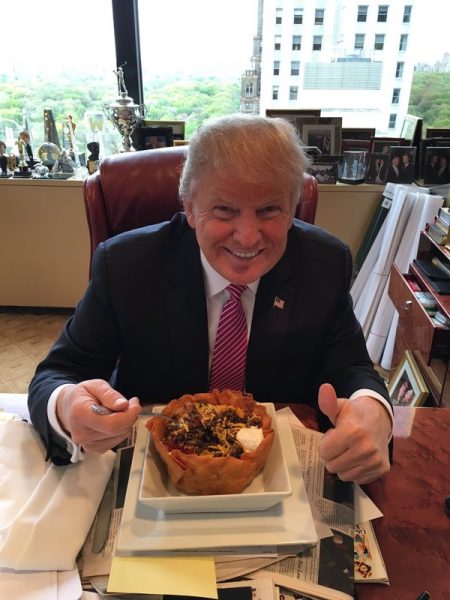

If you’re a Mexican American, it may seem difficult to discern anything positive about Donald Trump’s candidacy, and the even more disturbing possibility of a Trump presidency. After all, by this point, it’s become abundantly clear that Trump is, to use the description provided by Evan Osnos of The New Yorker, the “most anti-Mexican candidate in modern American history.”
But just in case there are any lingering doubts about the accuracy of the claim that Trump’s campaign is largely defined by anti-Mexican sentiment, it might be instructive to briefly review some of the more troubling features of the Trump campaign to date. There’s, of course, his brazen assertion that Mexican immigrants are “rapists” and “criminals,” and his pledge to build a wall along the U.S.-Mexico border that Mexico will pay for. There’s his promise to deport millions of undocumented Mexican immigrants residing in the United States, and his threat to block remittances to Mexico should Mexico fail to render payment for the border wall. There’s the time when he unceremoniously kicked Jorge Ramos out of a press conference.
There’s the Cinco De Mayo incident where Trump mockingly tweeted a photo of himself with a taco bowl sarcastically noting that he loved Hispanics. There’s also the time when, during a campaign rally in Manchester, New Hampshire, Trump felt compelled to point out a plane that happened to be flying overhead to those in attendance. Unable to pass on hurling yet another insult in Mexico’s direction, Trump interrupted his speech on that afternoon to joke, much to the crowd’s delight, that “it could be a Mexican plane up there . . . getting ready to attack.” Incidentally, the Trump campaign recently announced plans to launch a “Hispanic engagement tour” so stay tuned. There’s likely to be some additional incidents to add to this list soon.


And, of course, who can forget Trump’s crude and ill-advised verbal attack on a Mexican American federal judge in late May? Although, Judge Gonzalo Curiel is a U.S. citizen born in the United States, Trump claimed that the accomplished jurist was incapable of presiding over the civil fraud lawsuits related to Trump’s so-called “university” due to his “Mexican heritage.” In a clumsy attempt to explain the logic behind this alarming assertion, Trump acknowledged that many of his policy proposals including the border wall, were likely to antagonize someone of “Mexican heritage” like Judge Curiel, and that, therefore, pursuant to Trump’s reasoning, the fact that Judge Curiel was presiding over the case constituted an “absolute conflict” of interest.
In the wake of Trump’s comments about Judge Curiel, there appeared to be a broad and rapidly-forming consensus, even within the Republican Party, that Trump had taken his anti-Mexican rhetoric too far. Several of Trump’s fellow Republicans found the attack on Judge Curiel unpalatable or, at the very least, determined that it was too much of a political liability. Speaker of the House Paul Ryan (R-Wis.) described Trump’s comments about the judge as the “textbook definition of racism.” Senate Majority Leader Mitch McConnell (R-Ky.) said that he “couldn’t disagree more” with Trump’s comments while Former House Speaker Newt Gingrich called Trump’s comments “a big mistake” and “inexcusable.”
Interestingly, when Speaker Ryan was pressed to withdraw his endorsement of Trump by several Mexican American members of Congress, he steadfastly refused prompting Rep. Filemon Vela (D-Texas) to admonish that “you either support a racist or you don’t.” And like Speaker Ryan, neither Sen. McConnell nor Mr. Gingrich apparently felt strongly enough about the comments to withdraw their respective endorsements of Trump. In fact, they were so unfazed by the comments that they would eventually go on to speak on behalf of Trump at the Republican National Convention.
To his credit, Sen. Mark Kirk (R-Ill) did withdraw his endorsement of Trump specifically citing Trump’s comments about Judge Curiel in “context with other attacks on Hispanics.” Of course, there’s also the possibility that Kirk’s decision to vacate his support of Trump might have had more to do with the fact that he is currently facing a very strong challenge from Democratic Rep. Tammy Duckworth than with some deep-seated conviction that Trump’s comments were wrong. After all, as Rep. Duckworth’s campaign pointed out on Twitter, Sen. Kirk did not seem mind any of Trump’s previous comments about Mexican immigrants, at least not at the time they were made.
The Libertarian candidates, both former Republicans, have also candidly pointed out the anti-Mexican features of Trump’s candidacy. Gary Johnson, the former governor of New Mexico and current Libertarian presidential candidate, called Trump’s comments about Mexican immigrants “incendiary,” and asserted that Trump is “clearly” racist. Johnson’s running mate, William Weld, the former governor of Massachusetts and the Libertarian vice-presidential candidate, said he could hear echoes of the Kristallnacht in Trump’s plan to deport 11 million undocumented immigrants.
It’s also important to consider some of darker implications of Trump’s candidacy. There’s a reason why it has attracted white nationalists, neo-Nazis, the Ku Klux Klan, and other fringe elements. His candidacy has even inspired David Duke, the former Ku Klux Klan leader, to run for the U.S. Senate. As Johnathan Mahler of the New York Times once noted, Trump’s “support among White supremacists has been building from the day he announced his candidacy, and characterized Mexican immigrants as ‘rapists’,” And, according to Timothy Egan, also of the New York Times, it’s “no coincidence,” that “race haters” and “immigrant bashers” have gravitated to Trump’s candidacy. Trump’s supporters “know exactly what he stands for.”
This is admittedly not an exhaustive review of the problematic features of Trump’s candidacy and of those who have taken exception to it, but, at the very least, it should be sufficient to firmly establish the proposition that Trump’s campaign is steeped in anti-Mexican sentiment. But now that the nature of Trump’s candidacy has been revealed, and now that Trump has secured the Republican nomination, it would be wise for Mexican Americans to heed the warnings of Trump’s candidacy.
To begin with, Trump’s candidacy has vividly demonstrated the enduring strength of anti-Mexican sentiment as a political mechanism in American society. Propelled in large part by his promise to build a border wall and deport millions of undocumented Mexican immigrants, and by the general perception that he has positioned himself against all things Mexican, Trump has managed to garner unprecedented levels of support for his campaign. In a dubious sort of way, the numbers are actually quite impressive. Trump received a staggering 13.5 million votes, the most primary votes of any Republican in American history. In short, playing the anti-Mexican card has paid off in a big way for Trump. Even if Trump loses the general election this November, this is a fact that will not go unnoticed by others aspiring to political power in America in the future. For the sake of accuracy, it’s perhaps important to note that Trump didn’t create the anti-Mexican sentiment that has fueled his campaign. He’s just been particularly adept at tapping into it and unleashing it. It’s been there festering all along, and it will be there if he wins the election, and it will be there if he doesn’t.
It’s time for Mexican Americans to stop deluding themselves into believing that when Trump attacks Mexicans or Mexico he’s talking about someone else. If Trump’s candidacy has taught us anything it’s that Trump is not just peddling anti-Mexican immigrant sentiment. He’s peddling anti-Mexican sentiment in the broadest sense of the word Mexican, and this expansive interpretation of the word includes Mexican Americans. As his well-publicized attack on Judge Curiel demonstrates, Trump himself sees very little difference between a Mexican national and a Mexican American.
Trump’s supporters aren’t exactly the discerning types either. Last August, after being ejected from a Trump rally, Jorge Ramos, a Mexican American, was confronted by an angry Trump supporter who advised him to “get out of my country.” In Wisconsin, Indiana, and Iowa, his supporters, or, at least those he has inspired, have invoked Trump and the border wall to taunt, harass, and intimidate Mexican American high school students. Mexican Americans need to recognize that, in the event Trump happens to win the presidency, these already ugly scenes are going to get even uglier.
At this point, Mexican Americans have no choice but to confront the unpleasant reality that a major American political party has just nominated a man whose candidacy is broadly premised upon anti-Mexican sentiment. Although the larger ethnic Mexican community is far from monolithic, Mexican Americans must acknowledge the futility of continuing to recognize the superficial distinctions that divide us, and embrace the philosophy that an attack on any element of the Mexican community constitutes an attack on all Mexicans including Mexican Americans. We ignore the warnings of Trump’s candidacy at our own risk.
***
Follow Nicolas Mena @solidaritywmex


